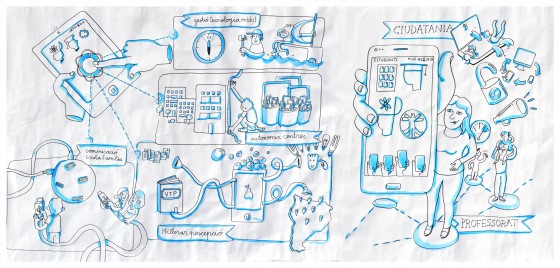PERSPECTIVES INTERNACIONALS D'EDUCACIÓ: Com incorporar els dispositius mòbils a l'aprenentatge a Catalunya? Presentació de la proposta Mobile Learning de la UNESCO, amb David Atchoarena, director de la Divisió de Desenvolupament del Professorat i Educació Superior a la UNESCO, Mercè Gisbert Cervera, coordinadora del Fòrum Internacional d'Educació i Tecnologia i del Departament de Pedagogia de la Universitat Rovira i Virgili, i Albert Forn, director Associat Mobile World Capital i responsable de mSchools. #mlearningcat #perspectivesbofill
El Centre UNESCO de Catalunya, la Fundació Jaume Bofill i la iniciativa mSchools presenten les "Directrius de la UNESCO per a les polítiques d'aprenentatge mòbil (UNESCO Policy Guidelines for Mobile Learning).
Als països desenvolupats, 4 de cada 5 persones posseeixen i utilitzen un telèfon mòbil. Aquests i altres dispositius, com ara les tauletes electròniques, s'han convertit en una atractiva eina educativa. Lluny de ser una possibilitat teòrica, l'aprenentatge mòbil és una realitat tangible a Catalunya i arreu del món.
Són moltes les experiències d'educadors, educadores i alumnes que utilitzen dispositius mòbils per accedir a una gran varietat de continguts educatius, parlar i compartir informació amb altres educands, sol•licitar suport a companys, companyes i professorat, crear continguts de manera col•laborativa, etc.
Davant d'aquest context tan divers, la comunitat internacional representada per la UNESCO ha definit unes polítiques d'aprenentatge mòbil que volen servir com un marc de treball pels diferents països membres i que tenim el privilegi de presentar-ho a Catalunya.
En l'acte es debat sobre les recomanacions d'aquest informe de l'Organització de les Nacions Unides per a la Educació, la Ciència i la Cultura (UNESCO) i sobre les estratègies que es podria adoptar a Catalunya per donar resposta a escenaris d'aprenentatge més rics i complexes.
-------------------------------------------------------------------------------------------------------------------------
UNESCO Mobile Learning
International Perspectives on Education Conference: The UNESCO Policy Guidelines for Mobile Learning presentation. Panelists: David Atchoarena, Director of the Division for Teacher Development and Higher Education at UNESCO, Mercè Gisbert Cervera, International Forum on Education and Technology Coordinator at Pedagogy Department of Rovira i Virgili University and Albert Forn, associate director at GSMA and mSchools responsible program.
Conference on the Policy Guidelines for Mobile Learning recommendations from the United Nations Educational, Scientific and Cultural Organization (UNESCO) and strategies to apply in Catalonia in order to answer richer and more complex needs of learning. UNESCO is working to help governments and individuals use mobile devices to advance education for all goals: respond to the challenges of particular educational contexts; supplement and enrich formal schooling; and, in general, make learning more accessible, equitable and flexible for students everywhere.
Today over 6 billion people have access to a connected mobile device and for every one person who accesses the Internet from a computer to do so from a mobile device.
Mobile technology is changing the way we live and it is beginning to change the way we learn.
What work is UNESCO doing in mobile learning?
For the past 3 years, UNESCO has been working to provide advice and guidance to governments and other stakeholders seeking to leverage increasingly ubiquitous and affordable mobile technologies for learning.
UNESCO has conducted research in a number of areas, such as mobile reading, mobile learning policies, and promoting gender equality with ICTs. The resulting publications describe the unique educational advantages of mobile technology and articulate strategies to build policy environments in which these advantages can take root and grow.
For further information on UNESCO Mobile Learning: http://www.unesco.org/new/en/unesco/t...


